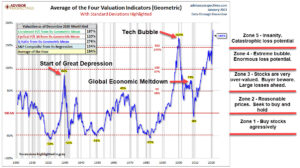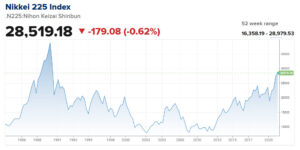
The stock market can be a fantastic tool to use during the journey towards financial security and flexibility. With each passing year though, the markets become more complex, with more media coverage and more noise related to every little movement. It is easy to get lost in the noise.
Financial markets have been around for centuries as people sought to store their wealth and have tools to aid in trade. As history has evolved and complexities expanded, one thing remains a constant throughout all history right up to the present times; human behavior and emotions prevent the smartest of humankind from obtaining what they think they want (which is usually more money).
Ego, greed, envy, fear, and a mindless desire to follow the delusions and madness of crowds are just some of the factors that cause most investors to become their own worst enemy.
Crowd folly and the natural ability to behave quite foolishly is deeply rooted in examples throughout history, both in financial markets and out. It’s only been about a dozen years since our last financial bubble exploding, and we are already multiple innings into a growing bubble of epic proportions. Simply put, valuations have never been higher (EVER) in market history.

(Source: Advisor Perspectives)
Behaviorally, the majority of people can’t help themselves when pursuing money. To make matters a bit more interesting, consider who the typical stock market investor is? Is it not someone who is usually college-educated? Is it not someone who is generally succeeding professionally? Is it not someone who works with numbers? Is it not someone who may work in the financial markets themselves? Human emotions run up and down the gamut of Wall Street from corporate executives to Wall Street brokerages and banks.
Human blunder and destructive behaviors know no boundaries when emotions are involved.
One question that I have asked myself repeatedly throughout my career is, “Are successful investors actually smarter, or are they just more disciplined and better behaved?” (I could tell you my opinion on that matter, and the answer isn’t “smarter.”)
And for those that believe that ignoring valuations and just blindly investing for the long-term is the answer, I offer you the following chart from Japan. For a few years, investors in Japan got wrapped up in the hype of greed and envy and ignored valuations during their epic bubble market that peaked in 1989. Many of those same investors who were in it for “the long-term” find themselves still down about 30% after nearly 32 years of investing post-bubble explosion.

Keeping Things Simple
Part of investing success requires not losing large amounts of capital along the way. Time can either be our greatest ally or our worst enemy. If you lose large amounts of capital, you may find that you can run out of the time required to recapture large losses before you need the money. Japanese investors learned this the hard way. So did American investors during the crash of 1929. It took American investors almost two and half decades to make up for those losses. Where will you be in 25 years?
Avoiding large losses when large losses are most probable IS THE MOST EFFECTIVE AND EFFICIENT WAY FORWARD.
It’s one thing to hear old investment axioms such as those spoken by Warrant Buffett like, “Be fearful when others are greedy, and be greedy when others are fearful.” But in the moment of truth, VERY few investors can behave in that manner. Emotions get in the way of common sense.
Too many investors get so hyper-focused on their end goal that they think in terms of, “Well, if I want to retire or reach a certain goal, I need to generate a certain rate of return at all times.” But markets don’t work that way. Markets move in longer cycles. Once in a while, bubbles are created. Markets don’t care about you personally or when you feel you need to retire. And if investors are so worried about not meeting their goals by using risk management principles, how exactly do they think they would achieve their goals by losing 50% – 80% of their capital? How exactly is exploding financially going to benefit them when the bubble bursts?
One of the most productive and effective methods of staying sane in an insane world is to invert the mainstream perspectives of those around you and look at things from an opposite viewpoint. Here’s an example.
If your goal is to be a successful investor, define to yourself the most likely ways to be an unsuccessful investor. What could you do to almost ensure that you would fail?
- Maybe you would buy companies that have no profits (bad businesses.)
- Maybe you would grossly overpay for your investments, which would undoubtedly mute your future returns.
- Maybe you would invest in things that are hyped up fads in the current markets.
- Maybe you would invest in companies with unethical management who are always looking to cheat the system.
- Maybe you would invest in companies with enormous debt loads and have borrowed so much money that it is unlikely that they will ever be able to pay it back.
- Maybe you would invest in companies that can’t control their expenses so even if they have revenues, they never generate positive cash flows.
The above is only a partial list but contains some good examples of ways to invest if you intended to lose a lot of money in the markets.
But wait! Isn’t’ that EXACTLY what the masses are doing RIGHT NOW in an attempt to be a successful investor?
- Current financial markets are loaded with companies that have little to no profits.
- Valuations are at insane extreme levels.
- There are hyped up fads that are trading at higher levels than companies with proven business models.
- Corporate debt levels are at crippling levels and only sustainable if interest rates stay low (or go lower) forever.
Markets could never get nutty and form bubbles without the delusions and madness of crowds. In many ways, humans are behaviorally programmed to fail because they want to follow the crowds. They need to follow the crowds. Most people can’t take a step back, use common sense, and think for themselves. That takes too much effort and is too unnerving. The behavior is, “If everybody else is doing it, it must be ok.”
Bubbles also outlast the patience and emotions of the majority of investors. That’s why bubbles continue to go up. That is also why the masses get caught up in bubbles and are permanently harmed by them.
As Your Advisor It Is My Duty To Keep You Out Of Harm’s Way
It is essential to share that the large majority of Wall Street operates with different mandates than you have to as an individual. Many so called, “financial advisors” are just stockbrokers with a vested interest in having people continuously invest in stocks (at all times). Can you imagine what would happen to Wall Street firms if collectively they all said, “Whoa, we are really getting ahead of ourselves. Everybody should sell stocks and go away for a while…” The firms themselves would cause their own financial demise.
Further, most institutions, endowments, mutual funds, and pensions have absolute mandates to invest money in stocks (regardless of valuations). Simply put, it doesn’t matter how much markets are in a bubble. They are mandated to keep investing.
Taking it one step further, most people on Wall Street are forced to keep up with their peers or a made-up index EVERY…SINGLE…QUARTER… It doesn’t matter if things are in a bubble. If the financial managers don’t keep up with the markets (even during bubbles), they lose their job. Said another way, their job isn’t to prevent big losses, their job is to keep their own jobs. If everybody loses money together, everybody keeps their jobs. After all, everybody else lost their shirts, so nobody gets punished individually.
But this is exactly the folly of Wall Street and herd mentality. Occasionally, markets get into crazy situations that make no sense fundamentally. It doesn’t happen often. It’s only happened a half dozen times in the last 120 years. But bubbles have common denominators. History repeats because human behavior never changes. We are programmed for the emotions of envy, greed, groupthink, and herd mentality.
A fiduciary advisor acts in a different capacity. A fiduciary advisor is supposed to put YOUR interest ahead of theirs. It’s actually quite easy to invest other people’s money recklessly and with risk. Why? It’s not their money if it is lost. Most “advisors” play the typical game on Wall Street where they keep the pedal to the metal 24/7/365. Money should always be chasing the hot stocks, the hot sectors, the hot regions. If prices go up, they look like a hero and take credit for being smart. But then occasionally, bubbles form, and significant losses come about. And guess what? The money lost isn’t your advisor’s money. They may or may not get fired by the client because supposedly, “everybody else lost their money and nobody could predict the stock market, right?”
So the typical advisor either convinces the client that they should just, “keep investing to try and make it back,” or they get fired and then they just go recruit new clients because there are a bunch of people at that point that got fired so now a game of musical chairs begins within the industry. The only negative is that everybody is managing a lot less money with new clients because the clients lost their capital.
A fiduciary advisor is supposed to keep you out of harms way. It’s like the doctor’s oath of, “first do no harm.” In rare occasions where bubbles form, your advisor is to remind you that your objective as an investor isn’t to be right or wrong in guessing the short term direction of the market or guess when the bubble will burst. Instead, it’s to explain clearly that the upside potential isn’t worth the downside risk (even if all the other kids are doing it.)
During a bubble, most investors will either choose to ignore the evidence of the bubble or they will begin to justify their participation and their behaviors. They start buying stocks at crazy prices but say to themselves things like,
- “I’ll get out if things turn bad,”
- “I’ll dollar-cost average because I’m a long-term investor,”
- “I’ll buy these stocks regardless of valuations because they are heading higher.”
- “Everybody else is doing it.”
- “How am I going to retire if I don’t make some money?”
- “Things are different this time…because…”
- “Don’t fight the Fed…the Fed has our back…” (Like the Fed was able to stop previous bubbles from popping??? News flash, the Fed creates bubbles.)
Investors say these same things in EVERY…SINGLE…BUBBLE…
Your advisor is supposed to keep you sane in an insane world. Your advisor is supposed to point out the risks that are right in front of your eyes. Your advisor is supposed to prevent you from taking massive losses when the risks are super high. Your advisor is supposed to keep you focused on the things that you control. Your advisor is supposed to remind you of the proven long-term principles of success.
Investors will never reach their goals if they lose large amounts of their capital. So, doesn’t it make sense to go back through history and study the very times that resulted in investors experiencing the biggest losses? Doesn’t it make sense that if you want to understand bubble markets to go back and study past bubbles? Doesn’t it make sense to study the mistakes made of investors in the past so that you don’t repeat them yourself?
Nobody ever knows exactly when bubbles will burst. For this bubble, it could be 2 weeks. It could be 2 months. It could be 2 years. The key principle of investing is to buy quality investments at good prices (even reasonable prices). Once investments are priced more favorably, then we will go back to normal investing. Why you buy quality investments at good prices, favorable results will follow.
In the meantime, I have never been more worried about investors losing money in capital markets as I have over the past 24+ months. The fact that the bubble has not yet burst but has expanded is even more concerning. The fact that the bubble has expanded doesn’t imply less risky results. Instead, the eventual consequences will be that much more harmful to those that aren’t paying attention to fundamental principles.
